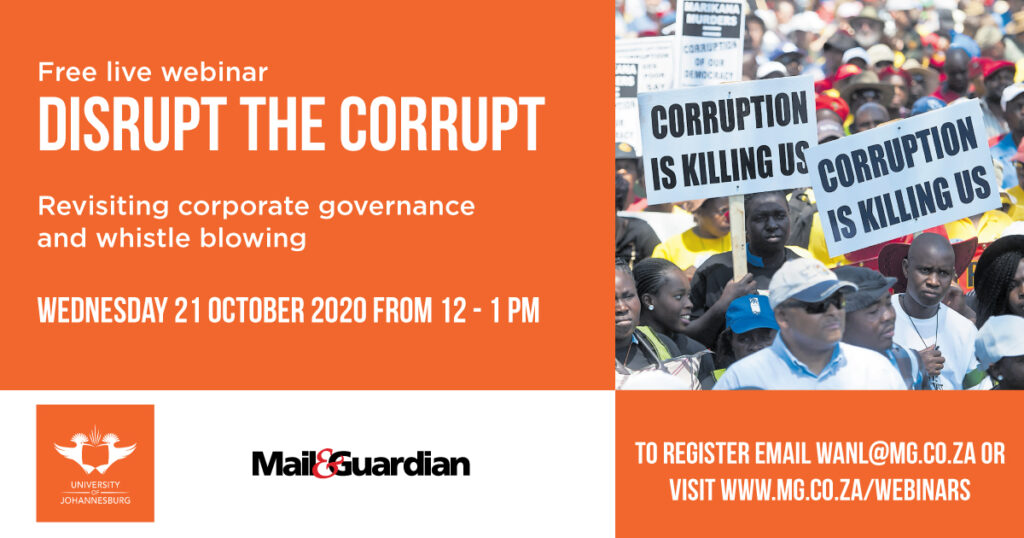Peter Goss is Professor of Practice: Governance and Forensic Auditing at the University of Johannesburg
This Mail & Guardian webinar was hosted by the University of Johannesburg (UJ). It featured Peter Goss, Professor of Practice: Governance and Forensic Auditing and at the Faculty of Law & College for Business and Economics at UJ; Parmi Natesan, Chief Executive Officer of the Institute of Directors in South Africa (IoDSA); and David Lewis, Executive Director at Corruption Watch. It was moderated by Shahan Ramkissoon, eNCA News Anchor.
Unless and until there are consequences for being caught for corrupt acts, it will unfortunately continue unabated in South Africa, benefitting a few to the cost of the majority. There are many knock-on effects from it, such as investors pulling out of the country and fewer job opportunities. Those who stand up and report corruption — whistle-blowers — deserve adequate protection, and should be hailed as heroes.
 Parmi Natesan is the Chief Executive Officer of the Institute of Directors in South Africa
Parmi Natesan is the Chief Executive Officer of the Institute of Directors in South AfricaIn their opening remarks, the speakers commented on the level of corruption in South Africa today. Peter Goss said it’s a “big problem” — at least two in three companies are exposed to corrupt advances, and the same number experience bureaucratic difficulties and delays if they don’t succumb to the offers. Parmi Natesan said there is no doubt that corruption is widespread in South Africa, and it is slowing our development, which is a problem, because after the pandemic, the economy is even more constrained. David Lewis said his organisation is often asked how much corruption is out there, but as there is little evidence — it comprises clandestine acts — any estimate is usually an underestimate. You can see the result in the destruction in state owned entities (SOEs) and companies, and in the low levels of public trust.
Has our government enabled corruption? Definitely, especially in the last 10 years, and recently regarding PPE contracts. The elephant in the room is the role of the corruptor: the firms that provide the goods or services to government departments, and the regulatory agencies that look the other way when money flows overseas or when money laundering takes place; we must start focusing on the other role-players in this conspiracy of corruption, said Goss.
 David Lewis is Executive Director at Corruption Watch
David Lewis is Executive Director at Corruption WatchCorruption has been endemic since the Mbeki and Mandela administrations, said Lewis, citing the Arms Deal and the Chancellor House case, but they didn’t engulf the state. Under Zuma a syndicate was enabled to take over the state, especially regarding the procurement functions of SOEs, and this went all the way up to the presidency. There is a lot being done now to tackle corruption, but still not enough.
In every corrupt deal, there are at least two parties, often involving state and private companies. Not enough action is being taken; more investigations are needed and the right policies must be put in place. There are not enough consequences, so often those who have been caught are then reappointed to other positions of trust, said Natesan.
Collective action theory requires taking real action and enforcement. The JSE fined Steinhoff less than R15-million for committing a R7-billion crime. We don’t need more commissions or committees, just enforcement and punitive actions, said Goss.
The IoDSA is a voluntary body but it does have a duty to hold its members to account in the public interest, said Natesan, and it can remove membership if a member breaches its code of conduct. Any company that claims to apply the King Report on Corporate Governance must demonstrate ethical and effective leadership. Professional bodies can and should exert influence by speaking out about corruption and by spreading the message of good governance. Codes are based on principles, but these can be broken by the humans that give effect to them, as can the law. What really counts is when there are consequences.
Regarding whistle-blowers, Lewis said big companies tick the box by having a hotline, handled by an accounting firm that may have been involved in corrupt activities itself. Most employees don’t trust these hotlines, and don’t believe anything will happen if they do report corruption. Many companies don’t respond well to allegations of corruption, especially if the people reported are leaders.
People at the top seem to live by different rules. Companies have rules that apply to everyone, but these rules are often bent. Leaders and employees must perform their duties in the best interests of their organisations and with care, skill and diligence; if this is done in the spirit that it was intended, there is no way that corruption can occur. If every part of the governance ecosystem of a company is competent and independent, and everyone genuinely wants to do the right thing, then we should never see corruption.
Corporate governance codes have let us down; we keep having monstrous economic crimes being committed. We must be careful of tick-box corporate governance; codes will not do it for us alone. Even though we have these codes, and we do need them, there is still huge corruption in South Africa, according to Goss.
“People who are caught for criminal violations must be thrown in jail,” said Lewis. Business organisations must punish their own members for breaking the rules of codes; reputation means a lot to most companies, and to many executives.
 Shahan Ramkissoon is an eNCA news anchor
Shahan Ramkissoon is an eNCA news anchorAre whistle-blowers protected in public sector? There are many codes and lots of legislation to encourage this, but we need to draw lessons from the witness protection programme, so that those who blow the whistle are protected adequately.
Whistle-blowers should be seen as real heroes, not as people who “don’t fit in” in your firm and who often get fired. We need a change in culture for this to happen. Protection for those who blow the whistle is absolutely vital. Many whistle-blowers are those who have opted for plea bargains in court, but may be implicated in corruption themselves, such as Angelo Agrizzi, who spilled the beans on Bosasa, and Philip Truter, who is doing the same in the VBS case.
The Hawks and NPA are starting to do their job, but Goss said they don’t deserve any praise yet; they should have been doing their job from the beginning. There is still no action on the real big fish — you can’t just go for the low-hanging fruit. We need to see ministers and CEOs in the accused box — or actually in jail. We need to sees the Aces and Molefes and Zwanes prosecuted.
Solutions
– Corporate governance codes are necessary, but those who enforce them must be on board; these codes must be enforced more robustly on a substance over form basis.
– The fish rots from the head, so we need to see consequences for the top people in government, otherwise people below them think, “if they can get away with it, why can’t I?”
– You have to raise the cost of engaging in corruption, such as enforcing prison time or fines. Reputational costs should not be under-estimated. There are some directors who do very little on the board, and allow corruption to occur — they should be declared delinquent.
– Whistle-blowing is not effective through hotlines; promoting an environment where people feel safe to raise corruption matters needs to be resolved. The stigma must be removed and a culture of reporting and transparency must be encouraged.
– Citizens must be outspoken and active, not complacent. For example, we must think carefully about who we vote for, and who we support as consumers.
To win the war against corruption, we have to be active in fighting it. Citizens must not regard corruption as a tax. We must link our voices to those carrying the fight forward; collective action is essential. It is a national problem, and we need to fight it together. It is a common problem for all South Africans. We must all keep putting pressure on our government to take the necessary steps.
To view the webinar, click here
